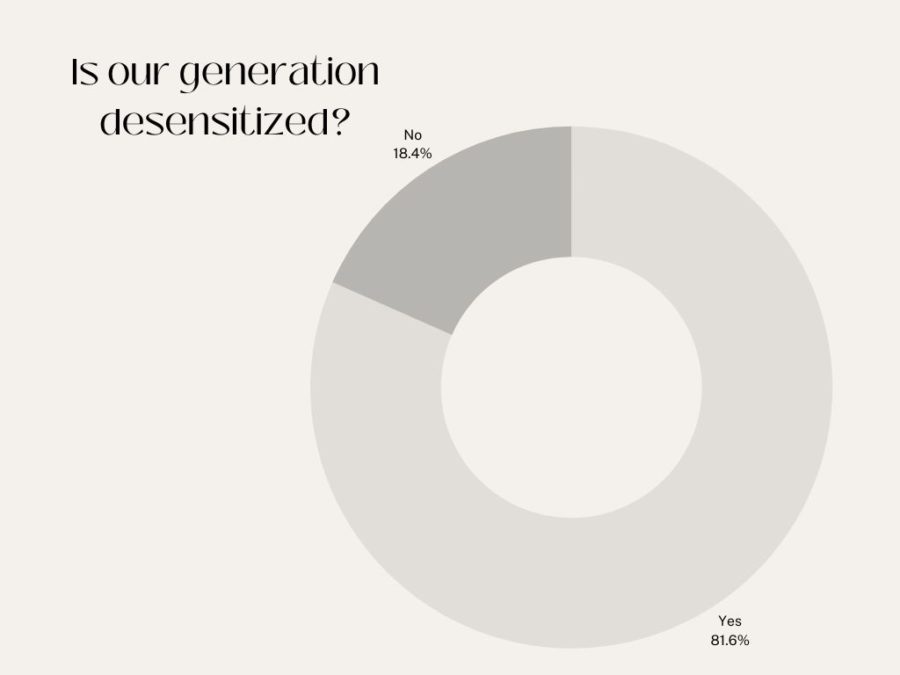Opinion: What’s the big deal?
Taking a look at Gen Z’s outlook on tragedy
This illustration captures the trance Gen Z is put under every time they witness tragedies.
December 21, 2022
Gen Z has been and lived through a lot. From 9/11 and the Great Recession to COVID-19, Gen Z has lived in a world full of tragedies since the start. Recently due to the ever-changing world around them- where social norms and media are continuously evolving- it seems like nothing phases them anymore. Overexposure has become a common phenomenon in the lives of many these past few decades. While others may still feel the sensation of shock when a catastrophe occurs, many have become desensitized to the whole situation at large. Becoming desensitized has been a silent disease spread amongst our generation as we are continuously exposed to tragedies.
Being desensitized is when one becomes less reactive toward a subject that was once viewed as shocking or even distressing. In a poll of 141 OHS students, 81.6 percent felt that society had become desensitized. Although some didn’t believe that society had become desensitized, 90.8 percent of students who took the poll said that they had little to no reactions toward mass casualty.
One’s reactions towards certain events can be blamed on the overconsumption of four things: Hollywood productions, the music industry, comedy and social media.
Hollywood and the music industry have been extremely effective at desensitizing their consumers to drugs, violence and pornography. Junior Vanessa Gonzalez said, “Our generation is so often exposed to tragedy and violence that we often don’t even blink an eye. Even our music, TV shows and movies are filled with aspects of mental illness, violence, drugs and sex. After a while, it can become easy to accept these things as normal because our world has drilled it into the heads of teenagers that they are. Sooner or later we have to come to the realization that we are desensitized. We have to be intentional to change this for the well-being of ourselves as well as the generations to come.”

More recently Hollywood is often seen portraying gruesome images of tragic events for the sole purpose of entertainment. This pattern of gruesome imagining has become popular in PG-13 films. According to a study done by Pediatrics, in 2012 PG-13 films contained more violence, to an extreme amount, in comparison to the R-rated films of that same year. Meanwhile, it is uncommon to go through a song without hearing a mention of domestic violence, glamorization of self-harm and substance abuse. For example, right now on Apple Music in the Today’s Hits playlist, eight out of the first 10 songs have some mention of either drug use, alcoholism, sex, gun violence and references to mental illness.
According to Trevor Wheelwright in a statistical article for Reviews.org, the average American spends two hours and 54 minutes on their phone each day. To put that into perspective on how much time that would accumulate yearly- it would be just around a month and a half or 44 days. Additionally, according to the Pew Research Center, 73 percent of Americans get their news from social media. Due to the rapid pace of news hitting one’s screen daily, it becomes difficult for the youth of today to fully understand and internalize the severity of what’s really going on around them. The events of 2020 for instance, the murder of George Floyd, the pandemic and the 2020 election, had caused an alteration to the media culture we once knew. Many can recall often witnessing acts of violence through videos of police brutality without internalizing the fact they were actively watching something horrific. Senior Annika Moran said, “At first, I was surprised and disturbed by these videos, but eventually the videos started to hold less meaning due to how many I’d see a day and eventually I would just scroll past.” In the case of the COVID death rates, due to the enormous amounts of deaths, many have forgotten that the numbers they see daily are not just numbers- they represent real people.
Overexposure to such violent images and tragic news can lead to harmful impacts on those witnessing them. In a study conducted to determine the effects that desensitization to violence has on the behavior of children, the National Library of Medicine stated, “The results suggest that emotional desensitization to violence in early adolescence contributes to serious violence in late adolescence.” The study also concluded that overexposure to violent video games in adolescence contributes to decreased empathy, consistent with greater emotional desensitization.
The more things like this become normalized in society the more people tend to underestimate a situation, this can be especially harmful to younger generations as they are still developing. Comedy for example is often used by people to make light of their situations in order to get a good laugh out of their own personal struggles. Many use this method as a coping mechanism. Although it is healthy to talk about one’s problems, doing it so often can lead to a feeling of numbness to the whole situation at large. However, joking about certain topics can lead to normalizing certain issues. In the case of reducing stigma around mental health, it can be helpful, but then it can also lead to reducing the actual severity of said issues by glamorizing mental health struggles.
Further joking about one’s own trauma can lead to that same person diminishing the true weight of their situation. Due to the new age of comedy and the development of “dark humor”, nothing is off the table, it is not uncommon to hear students joke and talk about suicide in a not serious manner. Lately, the casualness around suicidal language has gotten out of hand. Between 2000 and 2020, suicide rates have increased 30 percent according to the CDC. When someone makes a joke about ending their life it is highly doubtful that they had ever once paused to consider the severity behind their words. This is just another example of how desensitized society has become.
Although there may not be much one can do to reverse the effects overexposure has had on them, there are many ways to prevent further desensitization and harm towards others. The two biggest things to do are to notice what you see and how much you see of it, and to watch what you say as your words can easily affect others. From now on make it a habit to pause and think about how your words can affect someone and their awareness of the world around them.







